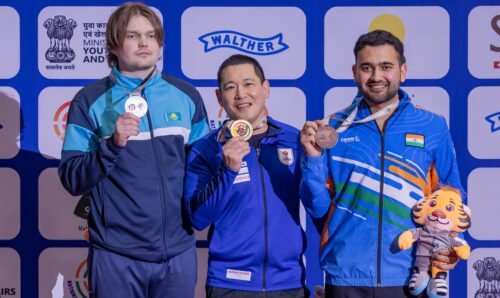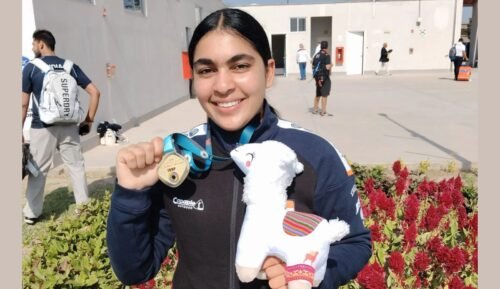The 100m sprinter’s new national record at Indian GP might not create ripples at the continental level but it surely is a boost for Indian athletics

Navneet Singh
On a warm Friday afternoon at the Sports Authority of India (SAI) Complex in Bengaluru, Punjab’s Gurindervir Singh sprinted his way to the books by improving on an 18-month-old men’s 100m national record, clocking 10.20 seconds.
The timing set by the 24-year-old sprinter, representing Reliance, at the opening leg of the Indian Grand Prix (IGP), has been the talk of the athletics fraternity. It surely has come as a boost to Indian athletics at the start of a new season. His coaching team is being hailed for the achievement. Gurindervir broke the record of Manikanta Holblidhar who clocked 10.23s in 2023. In the IGP race, Manikanta gave a good fight to Gurindervir and bettered his timing by .01sec. Two sprinters challenging each other is another good news for the Indian sprint.
However, a quick look at where India stands in 100m dash at the continental level doesn’t reveal a rosy picture. Countries like Japan and China have a good crop of sprinters in their stable. Last year 26 Asian athletes clocked below 10.20 secs. It included 10 Japanese, six Chinese and even a Sri Lankan (Yupun Abeykoon, 10.15s.) Yupun is also the first South Asian to dip under 10s and compete at the Tokyo Olympics. Japanese 25-year-old Abdul Hakim Sani Brown had the season’s best in Asia sprinting a sub-10s (9.96s) in 100m dash at the Paris Olympics semi-finals. Even that was not enough to make the cut for the final won by Noah Lyles (9.79s).
To further excel at the Asian Championships or the Asian Games, the Punjab sprinter should have a robust international exposure to polish his skills, believe experts in the field.
Gurindervir’s coach Sarabjit Singh firmly believes that the national 100m record will certainly revive sprints in Punjab.
“Since 2000, Punjab hasn’t produced a top sprinter like him (Gurindervir),” Sarabjit said.
“The 100m sprint has always been the main attraction of track and field and Gurindervir’s performance would certainly make a difference in pushing Punjab’s youngsters.”
Way back, at the 2000 Sydney Olympic Games, Punjab’s Ajay Raj Singh represented India in short relay. “Since then, there hasn’t been a quality sprinter from the state who could dominate at national events,” said the Punjab athletics coach.
“He should look to do well at the Asian or the Commonwealth Games and that would be a big encouragement for young athletes to take up sprinting in the state,” the athletics coach said.
Gurindervir’s performance at the first IGP hints that a conducive environment at Reliance Academy in Mumbai made the difference. “Improvement in micro seconds in an event like 100m dash is a big boost to confidence. I should be able to do better in the coming months,” said Gurindervir.
He shifted to Reliance Academy some six months back as he was struggling to sharpen his sprinting prowess due to lack of good facilities in his home state.
“There are no good facilities at the grassroots level in several districts in Punjab. There is no modern conditioning hall for elite athletes in Jalandhar where Gurindervir practiced,” the coach explained.
Early days of struggle
It was Gurindervir’s father—Kamaljeet Singh, a former volleyball player and an employee of the state police department, who encouraged him to take up sports in his schooldays.
Hailing from a village near Jalandhar, Gurindervir often accompanied his father for morning fitness drills. Later he started winning sprints at school level and shifted his base to Jalandhar and joined Punjab Institute of Sports. The move from village to city like Jalandhar gave Gurindervir more exposure, but at the same time facilities weren’t as good as expected to take him to a higher level.
Recalling his early days Gurindervir says how he had to prepare his food and then get ready for his training.
“Several times we had to cook our own meals as we didn’t get good food at the Punjab Institute of Sports,” the national record holder says.
“We had to often train on grassy ground as worn-out synthetic track in Jalandhar was not being repaired.”
The synthetic track at Jalandhar’s Sports College was re-laid after a gap of more than 15 years in 2021-2022, says his coach.
For main track sessions the group of sprinters including Gurindervir travelled to Tarn Taran some 70 km via road from Jalandhar. “It was challenging but there was no choice.”
Despite the shortcomings, Gurindervir made steady progress in the age group competitions. He won bronze at the Asian U20 and improved the national U20 100m record. He had clocked 10.27 seconds in 2019 during a domestic meet in Patiala.
“At times he felt frustrated as there was no recognition despite winning medals at the national level. He even wanted to migrate to a foreign country as some of his friends had gone there to earn their living,” says coach Sarabjit.
Gurindervir joined the Indian Navy via sports quota last year. No doubt Gurindervir’s excellent run at the first IGP in Bengaluru has put Punjab’s athletics in spotlight again. But to further build on this positive start, he needs to compete often in quality races. His next stop will be the Senior Federation Cup meet in Kochi, Kerala starting April 21.
Gurindervir is hoping to further improve on the national mark in Kochi.
“At IGP competitors get one race to prove themselves. But at the Federation Cup there will be preliminary rounds that will act as a warm up to the final race and will help in giving better performance,” said India’s the fastest male sprinter



